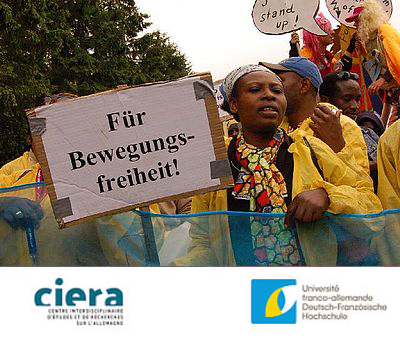The Government of Labor Mobility in Europe - Histories, Categories, Contestations
March 31 | 10:00
International labor mobility is a core element of the nowadays Europeanized societies. If the “freedom of movement of workers” has long been a self-evident pillar of the European integration, it has nowadays come to be contested due to rising political and economic tensions and nationalism. Current critics of European integration (for example during the Brexit campaign) claim that the “freedom of movement of workers” would be too costly and that it would undermine social cohesion.
In the light of these recent developments, the conference aims at shedding light on the genesis and changing meanings of the “freedom of movement of workers” as well as on the actual challenges this EU “pillar” is facing. The participants at this conference explores the history of European integration by focusing on the making of the international regulations of labor mobility within a broader and socio-historical framework.
After a first meeting in February 2020, we aim at furthering our study of the (re)production of the worker’s freedom of movement in the European area during a second workshop, on March 31st and April 1st 2022. This conference will also be the occasion to discuss first drafts of publications for a special issue that we are planning to publish in the upcoming year.
We are happy to welcome Adrian Favell, sociologist and director of the Bauman Institut at the Leeds University and currently Invited Fellow at the Wissenschaftskolleg zu Berlin, as keynote speaker on 31 March at 19h.
Organisation: Sebastian Büttner (Universität Erlangen), Hadrien Clouet (CERTOP/university of Toulouse), Karim Fertikh (SAGE/university of Strasbourg, Academic Institute of France) & Nikola Tietze (Centre Marc Bloch, Wiku)
Contact: nikola.tietze@cmb.hu-berlin.de
Keynote
Thursday 31 March 2022, 19h, Centre Marc Bloch (salle Tillon)
Adrian Favell
The end of freedom of movement in Europe? Assessing the effects and future of a borderless Europe from the Cold War to COVID
The European Union was built on the four freedoms -- of capital, goods and services -- but also, uniquely as a regional political economy, on the free movement of persons. In an era of crisis and dis-integration, the re-nationalisation of sovereignty, and in the midst of the COVID pandemic, it may be that this experiment in cosmopolitan capitalism is coming to an end. My lecture will offer an historical assessment of the successes and shortcomings of the "fourth freedom", and raise questions about its viable future as we move into a post-neo-liberal era of viral and biometric liberalism.
Adrian Favell is the author of various works on migration, multiculturalism, cosmopolitanism and cities, including Philosophies of Integration: Immigration and the Idea of Citizenship in France and Britain (1998), Eurostars and Eurocities: Free Movement and Mobility in an Integrating Europe (2008), a collection of essays, Immigration, Integration and Mobility: New Agendas in Migration Studies (2015), and a work in migration theory, The Integration Nation: Immigration and Colonial Power in Liberal Democracies (2022). Most recently, he has led the UK ESRC project, Northern Exposure: Race, Nation and Disaffection in “Ordinary” Towns and Cities after Brexit. Website: www.adrianfavell.com.
Picture : Migration Actions Monday June 4 (Rostock) / de.indymedia.org
Partners
CNRS-Research Center SAGE (university of Strasbourg), CIERA (Paris)
Location
Germaine-Tillion-SaalCentre Marc Bloch
Friedrichstrasse 191
10117 Berlin
